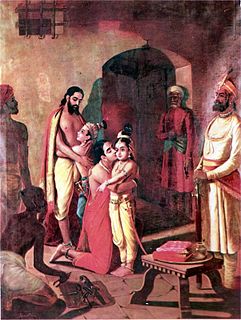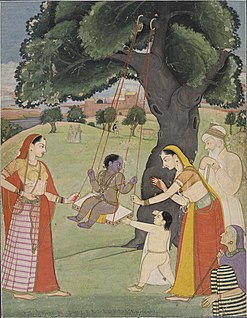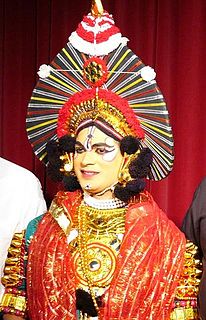
Balarama is a god and the elder brother of Krishna. He is particularly significant in the Jagannath tradition, as one of the triad deities. He is also known as Baladeva, Balabhadra, Haladhara and Halayudha. The first two epithets refer to his strength, the last two associate him with Hala from his strong associations with farming and farmers, as the deity who used farm equipment as weapons when needed.

In Hinduism, Devaki (देवकी) is the daughter of Ugrasena, sister of Kamsa, wife of Vasudeva and mother of Krishna.

Govinda and Gopāla are the names of Vishnu which mean Cowherd and Protector of Cows. These names are also popularly addressed to Krishna, referring to his youthful activity as a cowherd boy. This name appears as the 187th and the 539th name of Lord Vishnu in Vishnu Sahasranama. Lord Vishnu or his complete incarnation Krishna are regarded as the Supreme God in the Vaishnava tradition and also by much of the pan-Hindu tradition.
In Hinduism a Bhagavata, is a devotee, worshipper or follower of Bhagavanta namely God in his personal aspect. The form of worship is called bhakti which has the meaning of 'adoration'. In Sanskrit language 'Bhaga' stands for desire, 'antha' stands for the end. Hence Bhagavanta or Bhagavan means 'the one beyond desire or rebirth', whereas Bhagavata indicates a worshiper of this purified and persistent entity. It also refers to a tradition devoted to worship of Krishna, later assimilated into the concept of Narayana where Krishna is conceived as svayam bhagavan. According to some historical scholars, worship of Krishna emerged in the 1st century BC. However, Vaishnava traditionalists place it in the 4th century BC. Despite relative silence of the earlier Vedic sources, the features of Bhagavatism and principles of monotheism of Bhagavata school unfolding described in the Bhagavad Gita as viewed as an example of the belief that Vasudeva-Krishna is not an avatar of the Vedic Vishnu, but is the Supreme.

Nand, according to the Harivamsha and the Puranas, was the head of the Gopas, a tribe of cowherds referred as Holy Gwals. He is popularly known as the foster-father of Krishna.
In Hinduism, Rohini is the first consort of Vasudeva.She is the surrogate mother of Balarama and mother of his sister Subhadra, the sibling is also the god Krishna. She played a prominent role in the nurture of Krishna. She was a partial incarnation of Surabhi, the mother of the cows.

Kansa was the tyrant ruler of the Vrishni kingdom with its capital at Mathura. He is the brother of Devaki, the mother of the god Krishna—who slew Kamsa. Kamsa is described as human in early sources and a rakshasa (demon) in the Puranas. His royal house was called Bhoja and another of his names was Bhojapati.
Sonita was the country of Asura king Bana or Vana. His daughter Usha married Vasudeva Krishna's grandson Aniruddha. This kingdom is identified to be the Sonitpur district of Assam.

Pundra was an ancient kingdom during the Late Vedic period on the Indian Subcontinent, based in modern-day Bangladesh and West Bengal. Its capital was in "Pundranagara"; also referred as Pundravardhana or Mahasthangarh, situated in Bogra upon ancient karatoya river of Northern Bangladesh. A Pundra king challenged Vasudeva Krishna by imitating his attributes. He called himself Paundraka Vasudeva. He was later killed by Vasudeva Krishna in a battle.

Vanga was an ancient kingdom and geopolitical division on the Ganges delta in the Indian subcontinent. The kingdom is one of the namesakes of the Bengal region. It was located in southern Bengal, with the core region including present-day southern West Bengal (India) and southwestern Bangladesh. Vanga features prominently in the epics and tales of ancient India as well as in the history of Sri Lanka.

Within the Indian epic Mahabharata, Krishna was the son of the Yadava chief Vasudeva and his wife Devaki. Hence he was known as Vasudeva Krishna or Vaasudeva.

Ananta Vasudeva Temple is a Hindu temple dedicated to Lord Krishna, an avatar of Lord Vishnu located in Bhubaneswar, the state capital of Odisha, India. The temple was constructed in the thirteenth century, and the complete murties of Krishna, Balarama and Subhadra are worshipped there. Balarama stands under a seven hooded serpent, Subhadra holds Jewels pot and lotus in her two hands keeping her left foot over another jewel pot, while Krishna holds a mace, chakra, lotus and a conch. The temple dates back to the period of Chandrika Devi, the daughter of Anangabhima III, during the reign of the king Bhanudeva.

Bala Krishna sometimes translated to "Divine Child Krishna", is historically one of the early forms of worship in Krishnaism and an element of the history of Krishna worship in antiquity. This tradition is considered as a part of the number of other traditions that led to amalgamation in a later stage of the historical development and culminate in worship of Radha Krishna as Svayam bhagavan. Other monotheist traditions are Bhagavatism and Cult of Gopala, that along with Cult of Krishna-Vasudeva form the basis of the current tradition of the monotheistic Krishna religion. The worship of Balakrishna, the divine child, while a significant feature of the Krishna religion, often receives less attention, however it is one of the most popular deities of Krishna in many parts of India today. Early evidence of such worship can be found or as early as the 4th century BC according to evidence in Megasthenes and in the Arthashastra of Kautilya, when Vāsudeva (as the son of Vasudeva was worshiped as supreme Deity in a strongly monotheistic format, where the supreme Being was perfect, eternal and full of grace.
Svayam Bhagavān is a Sanskrit theological term for the concept of absolute representation of God as Bhagavan - The Supreme Personality who possesses all riches, all strength, all fame, all beauty, all knowledge and all renunciation.

The cult of Krishna Vāsudeva is historically one of the earliest forms of worship in Krishnaism and Vaishnavism. It is believed to be a significant tradition of the early history of the worship of Krishna in antiquity. This tradition is considered separately to other traditions that led to amalgamation at a later stage of the historical development. Other traditions are Bhagavatism and the Cult of Gopala, that along with the Cult of Bala-Krishna, form the basis of current tradition of monotheistic religion of Krishna.
According to the Jain cosmology, the śalākāpuruṣa "illustrious or worthy persons" are 63 illustrious beings who appear during each half-time cycle. They are also known as the triṣaṣṭiśalākāpuruṣa. The Jain universal or legendary history is a compilation of the deeds of these illustrious persons. Their life stories are said to be most inspiring.

Vasudeva Upanishad (Sanskrit: वासुदेव उपनिषत्, or Vasudevopanishad is one of 108 Upanishadic Hindu texts, written in Sanskrit language. It belongs to the Vaishnava sect, which worships Vishnu and his avatar Krishna, and this late medieval era minor Upanishad is attached to the Samaveda. It is one of the 14 Vaishnava Upanishads dedicated to Vaishnava sacred marks, including the Urdhva Pundra - the Vaishnava tilaka. It is described in a sermon by Krishna to the sage Narada.













